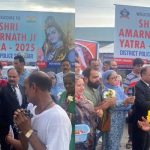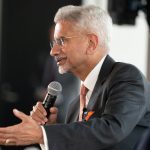Baramulla, Oct 17: Experts on Tuesday said that National Education Policy (NEP) 2020 has ushered in a significant paradigm shift by placing students at the center of the learning experience and promoting the exchange of ideas.
They said that since its implementation, it has redefined the educational priorities and approaches, focusing on empowering students and fostering a culture of innovation and creativity in the education system.
Addressing a day long Youth Seminar organised by Indian Army in collaboration with weekly The Kashmir Central Magazine at Delina Baramulla Campus of University of Kashmir.
The two panel discussions were held on “Innovative Pedagogies & NEP
– Revitalizing our Education System and The Call for Comprehensive Reforms.
The first session was chaired and moderated by prominent political scientist & educationist, Prof Gul Mohd Wani, while Prof. Sheikh Ajaz Bashir Principal Amar Singh College, Srinagar and Bashir Assad, Editor-in-Chief Kashmir Central Weekly were the two panelists for the session.
During the session, Prof. Ajaz said NEP2020 emphasizes the importance of multidisciplinary education, allowing students to choose subjects across various disciplines, thereby breaking down traditional academic silos.
“This encourages students to have a broader perspective and facilitates the exchange of ideas across different fields of study,” he said
Prof. Ajaz who is Nodal Principal of Kashmir Division colleges said that there is a need to preserve cultural and linguistic diversity as well has emerged as a pressing concern in the global world.
Highlighting the importance of mother tongue, Journalist Bashir Assad said in an era of global connectivity and rapid cultural shifts, the importance of cherishing one’s mother language cannot be overstated.
“It is not just a linguistic bond; it is the cornerstone of cultural identity. Kashmiris have a rich linguistic heritage, with the prominence of Kashmiri and Urdu. It is essential for society to take pride in its mother language, as those who neglect it often find themselves on the periphery of cultural discourse,” he said.
“Ahad Zargar, a celebrated poet, is one such luminary. His poetry, like that of the legendary Sochi Kral, transcends time and space, inviting comparison even to the likes of Socrates in the realm of philosophy,” Asad said.
He said a peaceful environment is important, the kind of atmosphere we have currently is sustainable and we are able to have a free atmosphere in which students can compete at the national and international levels.
While Prof. Gul Mohammad underlined the imperative need for students to develop strong reading skills and advocated for a cultural shift towards a more immersive educational experience.
He said the absence of a robust culture of reading in the broader community, which is essential to cultivate the habit of reading among students. The deficiency of engagement with substantial literature, he contended, is a two-way street, reflecting the shortcomings of both students and the surrounding society, Prof. Mohammad said.
Later the second session was titled “Nurturing the Roots of Kashmiri Culture through Sufi Traditions, Fostering Interfaith Contact”.
It was chaired by Mushtaq Ali Khan Ahmad (Actor, Film Maker & Art Promoter), social activist Mehjabeen Nabi and session was moderated by Prof. Gul Mohammad.
Addressing the gathering, Mushtaq Ali Khan said Jammu and Kashmir, often referred to as “Mini India,” is a linguistic wonderland. It is home to five major languages that mirror the cultural amalgamation within the region.
“These languages include Kashmiri, Dogri, Balti, Pashto, and Pahari. Each of these languages carries a distinct cultural identity and is cherished by the people,” he said.
Social activist Mehjabeen Nab, who is on a mission to eradicate drug menace from Kashmir, said eradicating the drug menace in Kashmir is indeed a crucial challenge that requires a collective effort and increased awareness.
She said addressing the issue of drug abuse in Kashmir demands the active involvement of multiple stakeholders, including government agencies, law enforcement, healthcare professionals, community organizations, and individuals.
In his concluding remarks, Prof G Mohammad said Kashmir has rich cultural heritage and people have emotional attachment with its Geography.
The audience were then treated to an exhilarating glimpse of Kashmir’s cultural diversity by a troupe of Ms Shagufta Rehman.
The students and faculty representing schools and colleges from all across North Kashmir enthusiastically participated in the seminar with incisive and thought-provoking queries and opinions to the panelists.
The event was followed by Question-Answers by the students from various educational institutions.








